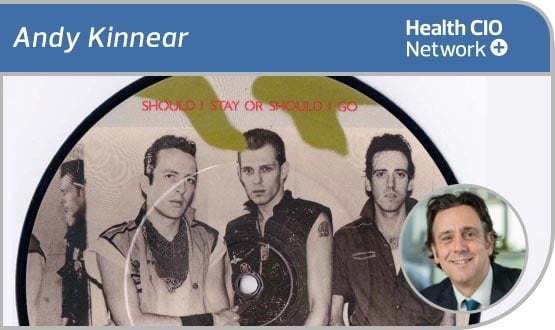I began my NHS career on 11 March 1991, so a few weeks ago I celebrated 25 years NHS service.
In the absence of formal celebrations, I invited a few old friends out for a beer and reminiscence about the changes we have seen and our thoughts on the future.
As is so often the case with these things, we looked back through rose tinted glasses a little bit too much. I recounted with fondness a working day that included a lunchtime trip to the subsidised canteen for ‘school dinner’ before a quick pint in The King Charles and a game of snooker back at the office – yes our office actually had a snooker table in the basement .
It wasn’t all like that, of course; we were restricted to only three cups of tea per day, each of them provided by a matronly tea lady and consumed in a smoke-filled office, hazy and stinking from our colleague’s tobacco craving.
Data before big data
The digital world was very different, too. Back then, I was a junior information analyst. My day consisted of writing programmes to query the database of inpatient and outpatient activity for the South West of England.
These short programmes ran overnight on clunky system called ‘Centrelink’, returning us basic tables of results next morning. These results would often not yield the expected outcome, and so the next day would see a revision to the programme and finger crossing that it would run correctly this time.
Often, the time spent reformatting the results into a presentation a manager could use to support their case would double the turnaround time.
The delivery of analytics to the managers making requests for analysis was measured in days and weeks not seconds. This feels Victorian when compared to the rapid processing we see in ‘big data’ applications these days and the instant nature of analysis as a result.
The South West was relatively well served by Centrelink, though. The database was made possible because all of the hospital trusts (or district health authority hospitals as they were back then) were using the same patient administration system.
This was a system developed in-house by the regional computer centre that also ran the extracts for the whole South West from Bristol, allowing junior analysts like me to cut our teeth.
Shared PASsions
The development of these PAS systems was a wholly public affair, with PAS managers across the region working with their local clinical colleagues on suggested revisions before meeting together to design the next release.
Sure, the systems were less complex than we might expect now; but the unified approach created a scale, consistency and value for money not seen since. Back then, all talk of ruthless standardisation was moot – we were standardised already.
What I think I enjoyed most was the sense of collective ambition we all shared. Colleagues would meet from Gloucester to Cornwall a feel united around a consistent ambition, to develop the best systems we could.
There was a very strong feeling that we all worked together; part of one health system. It probably wasn’t quite as harmonious as all that.
I was pretty junior and not privy to the high level stuff back then, but I can remember more than the odd disagreement around approach or timescale. Nevertheless, there was definitely a sense of togetherness.
Back to the future
The privatisation of the regional computer centre changed the dynamic considerably. As market forces took hold during the 1990s, a variety of approaches emerged across the region.
The National Programme for IT in the NHS came along in 2000, but its well documented attempts to bring back a semblance of standardisation had muted success.
So the world we occupy today is much changed from 1991. Even so, the sense of collective spirit is beginning to show signs of life once again.
A recent South West chief information officers’ forum in sunny Taunton was full of folks seeking to find ways to work better together; throwing off their organisational shackles and considering how joined-up approaches to delivery of technology could benefit us all.
My good friend Mal Senior injected some northern bluntness; galvanising a willing audience to “work together.”
In the week of my 25th anniversary, I was also lucky enough to speak at the King’s Fund and offered a few thoughts around the kinds of behaviours we need going forward.
I described the four engines driving ‘HMS Digital Transformation’ – NHS England in its role as strategist and funder, the Health and Social Care Information Centre in its role as national systems and standards provider, our suppliers in their role as software developers and innovators, and the ‘local’ digital workforce in their role as deliverers of the digital future.
I reflected on the behaviours we need to ensure these engines as fully tuned and work in harmony to drive the ship forward.
All in IT together?
It is my view that these are very like the behaviours I witnessed way back when, as I started out in my career. A willingness to think, act, lead, and ultimately behave in a way that puts the needs of our public and patients – and the needs of our care professionals who support them – ahead of the more parochial needs created by organisational structures.
The national agencies are unrecognisable from where they were two years ago and local communities are showing real signs of collective thinking, driven on by clever strategic vehicles like the local digital roadmaps. Our suppliers will react and respond to this, and we need to be open to that.
So 25 years on I am less naïve and a tad but more cynical, but I am still really upbeat about the future. I can hardly remember a time where the morale of folks delivering the digital programme for the NHS was this high; there is a fabulous can-do attitude and a sense that we are all in this together.
I am not the least bit blind to the scale of the challenge, the complexity of the problem, or the budget we are likely to need; but the first task in any successful endeavour is to get people believing, thinking, leading and behaving in a way that serves the common goal. I saw it in 1991 and I really do feel I can see it again today.
Andy Kinnear
|



